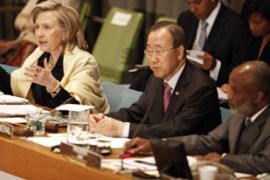Haiti promised $10bn for rebuilding
UN chief says amount pledged at donor conference “far beyond expectations”.

Caution
International aid agency Oxfam said although the amount pledged was impressive, countries must ensure the funds were new, “not recycled money taken from other humanitarian crises”.
| in depth | |||||||||||||||||
|
“The poor and vulnerable of other disasters should not be paying for this,” Philippe Mathieu, a spokesman for Oxfam, said.
It was not immediately clear if all the pledges involved new money, as some delegates appeared to be describing existing aid projects.
Ban had previously called for quick donations in response to a UN request for $1.4bn in immediate humanitarian assistance for Haiti, which even before the January 12 earthquake was the poorest country in the western hemisphere.
So far, that request has only been half funded, fuelling fears that the rainy season will compound the disaster for some the 1.2 million Haitians left homeless by the disaster.
But on Wednesday Ban was optimistic, saying the pledges at the conference were “the down payment Haiti needs for wholesale national renewal. It is the way to build back better”.
The EU, promising $1.6bn, and the US with $1.15bn, led 50 countries in pledging $5.3bn for the first two years of reconstruction.
That was substantially more than the $3.8bn the Haitian government had sought for that period.
 |
| Haiti officials have said rebuilding the country could take a decade [Reuters] |
But the remaining $4.6bn pledged for beyond the two-year mark – bringing the total amount to $9.9bn – fell short of the $11.5bn total package that Haiti’s government had wanted to rebuild what was destroyed by the quake but also to decentralise the economy to create jobs and wealth outside Port-au-Prince.
Still, Rene Preval, Haiti’s president, thanked donors for the “heartfelt effort that demonstrates that Haiti is not on its own” and said his country “must take advantage of this opportunity that we now have”.
“I appeal to my fellow Haitians to understand the effort that has now been made by the international community and the responsibility that we now have in the interests of our country to respond rapidly and appropriately,” he said.
Preval had asked donors to focus on education and help the country’s nine million people provide for their own future.
Call for transparency
And Clinton echoed that call, saying: “Aid is important but aid has never saved a country. Our goal must be the empowerment of the Haitian people – they’re the ones who will carry on the work of rebuilding Haiti long after our involvement has ended.”
|
“Aid is important but aid has never saved a country. Our goal must be the empowerment of the Haitian people” Hillary Clinton, US Secretary of State |
Clinton also stressed that Haiti’s leaders must guide “a transparent recovery”, adding that the international community must change its past practice of working around the government and ensure that it is working with the government.
Haiti’s government has detailed its plans for the money in a 55-page rebuilding plan, at the core of which is the Interim Haiti Recovery Commission, which will be co-chaired by Clinton’s husband, Bill, the former US president, and Jean-Max Bellerive, Haiti’s prime minister.
The commission’s two-dozen members will be tasked with co-ordinating and paying out the aid money expected to flow in, a key mechanism to allay donor concerns over Haiti’s history of official corruption and political unrest, and assure them that the money will go where it is intended.
The magnitude-7 earthquake destroyed the government and commercial centre of Haiti’s capital Port-au-Prince and killed between 217,000 and 300,000 people, according to government estimates.
An estimated 1.2 million people were also made homeless, many of whom continue to live in tents and under makeshift shelter.
